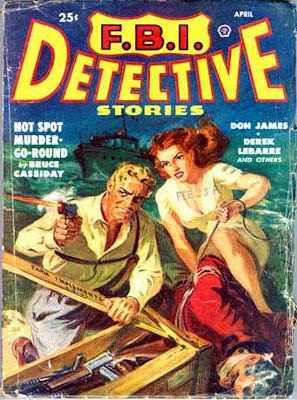2012 was a year in which both my reading and my writing
totals went down by quite a bit. Where did the time go?
READING
I read 112 books this year, down more than 25% from last
year. There were still plenty of good books, mind you. Here are my ten favorites,
alphabetical by author, with the caveat that these could have been written and
published anytime, but I read them in 2012:
THE BELLS OF EL DIABLO, Peter Brandvold writing as Frank
Leslie – a fine Western adventure novel about hunting for lost treasure in
post-Civil War Mexico from one of the best Western writers in the business,
Mean Pete his own self.
THE SAINT IN MIAMI, Leslie Charteris – I reread this great
novel (the first Saint novel I ever read) so I could write an introduction for
an upcoming e-book reprint of it.
DEAD MAN'S BRAND, Norbert Davis – a great collection of pulp
Western stories from a writer best known for his mysteries, published by Tom
Roberts of Black Dog Books, who also painted the excellent cover.
ONE IS A LONELY NUMBER, Bruce Elliott – reprint from Stark
House Press of an excellent noir novel I'd never even heard of.
McGRAVE, Lee Goldberg – the fastest-paced book I read this
year and maybe the most purely entertaining. It's a fish-out-of-water cop
thriller that's great fun from start to finish.
GUNSHOTS IN ANOTHER ROOM: THE FORGOTTEN LIFE OF DAN J. MARLOWE, Charles Kelly – a brilliant biography of the great noir and hardboiled
paperbacker Dan J. Marlowe, written with novelistic flair by Charles Kelly.
RICK O'SHAY, HIPSHOT, AND ME, Stan Lynde – a fine memoir
from comic strip creator and now Western novelist Stan Lynde, along with an
extensive collection of storylines reprinted from his iconic strip RICK O'SHAY.
WORDSLINGERS, Will Murray – this history of the Western pulp
magazines and their authors and editors isn't out yet, but I was fortunate
enough to read an advance copy of it and loved it. If you have any interest in
Westerns, pulps, or professional writing in general, this one gets my highest
recommendation.
ROGUE ANGEL #1: DESTINY, Mel Odom writing as Alex Archer – a
compelling archeological mystery that also serves as a top-notch origin story
for the character Annja Creed and the long-running adventure series Rogue
Angel.
BLOOD ON THE MINK, Robert Silverberg – Hard Case Crime
reprint of a long-lost pseudonymous hardboiled crime gem from legendary science
fiction author Robert Silverberg, plus two of Silverberg's crime digest stories
from the same era. This is great stuff from a master storyteller.
What the heck, let's give Honorable Mentions to a few others,
this time in the order in which I read them: TRIGGER TRIO, a collection of
Western pulp yarns that overcame my resistance to author Ernest Haycox; SEEKERS OF THE GLITTERING FETISH and SWAMP FETISH, collecting all of Dan Cushman's
Armless O'Neil pulp adventure yarns (I wrote the intro to the second volume);
STACKED DECK, a collection of Johnny Liddell private eye yarns by Frank Kane;
FLINT, an offbeat Western novel by Arnold Hano; KILLER INSTINCTS, a fine debut
thriller from Jack Badelaire; BULLET FOR A VIRGIN! by Peter Brandvold, proving
that the Spicy Western lives; CITY OF HERETICS, a great second novel from Heath
Lowrance; BRUCE MINNEY: THE MAN WHO PAINTED EVERYTHING, a bio and retrospective
of a great career in illustration, by the artist's son-in-law Thomas Ziegler;
and TOMATO CAN COMEBACK by Henry Brown writing as Jack Tunney, my favorite of
the Fight Card books that came out this year. How's that for a second ten? It
just goes to prove that while I might not have read as many books this year, I still
read a lot of really, really good ones.
WRITING
Unless I have a miraculous day today, I'm going to wind up
with about 500 fewer pages than last year, but I managed to top a million words
again and should finish with around 1.15 million for the year. That breaks down
into twelve and a half novels (I'm in the mddle of one) and six short stories
and novellas. I've tried to maintain an accurate word count but I can't do it.
I'm a page guy, even in this digital age. Some habits are too hard to break.
Part of my decrease in pages is technological: I upgraded to a newer version of
Word, and for some reason it puts more words on a page even with all the margin
settings the same. Also, I finally stopped putting two spaces after a period. I
didn't think I could do that after all those years, but it was surprisingly
easy. That actually affects the output more than you'd think and probably
accounts for 50 or so pages over the course of a year. But there's still no
doubt that I wrote less in 2012 than I did in the past couple of years. I
already have more work lined up for 2013 than I did this year, so I'm going to
have to bump up my speed a little. It's a good problem to have.
Meanwhile, in the immortal words of that great philosopher
Frankie Avalon, I plan to keep a-movin' and a-groovin' – don't stop now!

























